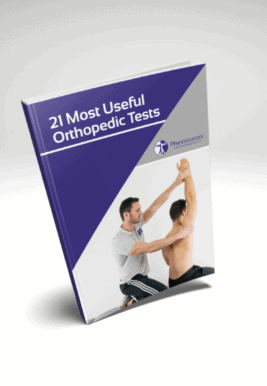Learn
Supine Flexion Resistance Test | SLAP Lesions | Shoulder Assessment
Gismervik et al. in the year 2017 performed a rigorous meta-analysis of shoulder tests for SLAP lesions and found the Compression-Rotation Test to be the most accurate test with a sensitivity of 43% and a specificity of 89%. While the test is still rather weak to exclude SLAP lesions, it has a moderate clinical value to confirm a SLAP tear.
The supine flexion resistance test is performed with the patient in the supine position. The patient is asked to rest the arm above the head in full elevation, with the palms facing upward. The examiner is standing on the shoulder to be tested and grasps the patient’s arm just distal to the elbow. Then the patient is asked to perform forward flexion of the arm as if simulating a throwing motion.
This test is considered positive only if pain is elicited deep inside the shoulder joint or at the dorsal aspect of the shoulder along the joint line during the resisted movement. Performing the test on the nonaffected shoulder should not elicit any pain.
In the study by Ebinger et al. The Supine Flexion Resistance test had a higher specificity than the O’Brien and Speed’s test and higher sensitivity in the group of patients with shoulder complaints and an isolated SLAP lesion without rotator cuff lesions. A limitation of the test however is, that it can only be used in patients with a free range of motion of the involved shoulder because patients with partial shoulder stiffness experience pain just by trying to reach the full flexion examination position as a result of the capsular adhesions.
21 OF THE MOST USEFUL ORTHOPAEDIC TESTS IN CLINICAL PRACTICE

Other orthopedic tests to assess biceps pathology & SLAP lesions are:
- Active Compression Test of O’Brien
- Yergason’s Test
- Biceps Load I Test
- Biceps Load II Test
- 3-Pack Examination
- Crank Test
- Passive Distraction Test
- Labral Tension Test
- Dynamic Labral Shear Test
- Upper Cut Test
- Compression Rotation Test
- Anterior Slide Test
- Speeds Test
- Passive Compression Test
- Resisted Supine External Rotation Test
Like what you’re learning?
BUY THE FULL PHYSIOTUTORS ASSESSMENT BOOK
- 600+ Pages e-Book
- Interactive Content (Direct Video Demonstration, PubMed articles)
- Statistical Values for all Special Tests from the latest research
- Available in 🇬🇧 🇩🇪 🇫🇷 🇪🇸 🇮🇹 🇵🇹 🇹🇷
- And much more!








